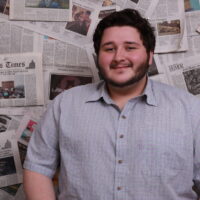The basement of Carlson Library houses rollercoasters, a medieval alchemical laboratory, and a futuristic musical lightsaber performance space.
Somehow, that sentence is 100% true — and it is all thanks to Studio X, the University’s half-library, half-experimentation zone dedicated to augmented and virtual reality, known together as extended reality (XR). The studio released its first annual report earlier this month recapping the studio’s soft launch year, which was full of projects, workshops, and competitions centered on getting students exposed to these budding technologies and exploring their horizons.
According to the report, the space served 529 first-time users of XR technologies and facilitated 520 equipment bookings across 48 departments and six schools in the 2021-2022 academic year. Senior Waleed Nadeem, a Karp Library Fellow and brand ambassador for Studio X, said the exposure for first-timers was a huge achievement.
“It is always such an incredible experience when you put on a headset on a new user and see their face light up with wonder,” he wrote to the Campus Times. “Every user has a different emotion before they wear the headset ranging from hesitation to excitement and it’s always fun to hear them shout or laugh when they see the virtual world. Every time a new user wears the headset it allows me to relive the excitement and fall in love with it once again.”
Studio X also hosted nine student-led workshops covering a wide range of topics, many with titles descended from clickbait heaven. From a “Create Your Own VR Escape Room” session to “VR Music Composition in Unity” and “Create Your Own VR Flappy Bird” — there was a clear popular audience in mind.
Alongside student-led workshops, the report also highlights how Studio X has helped integrate XR technologies into classroom instruction and scholarship. Assistant Professor of Computer Science Zhen Bai, for instance, brought her XR class into Studio X to help them overcome difficulties they had developing programs for VR headsets due to their lack of availability.
However, the report also notes that the studio’s successes came amid setbacks.
“Supply chain issues delayed our technology,” Studio X Director Emily Sherwood said in the report. “And like many units across the University, we were short-staffed and had trouble filling positions and finding people with the skills we needed. Although we have assembled a team of dedicated and skilled students, we see our team as a work-in-progress. Case in point: we still don’t have the staff to fully meet faculty needs. Finally, as is true with all new spaces, we discovered physical and technical limitations, which sometimes forced us to rethink our strategies for programming and events.”
Nadeem added that he thinks Studio X could be improved if it were given a full dedicated computer lab. Currently the studio has a few desktop computers, but their setup is smaller than the Rettner and IT Center computer labs. Nadeem said he was optimistic about change because the studio is a “student led space.”
Overall, Nadeem said he felt the most meaningful work he has done with Studio X is to “represent possibility” for students who may feel that they do not have a role in the growing XR sector.
“I am not a computer science major,” he wrote. “I am a business information systems and Digital Media Studies student and if I can make these experiences and work on these novel immersive technologies, then so can anyone else. Studio X is for everyone regardless of your major or experience, all you need is a passion for learning.”


